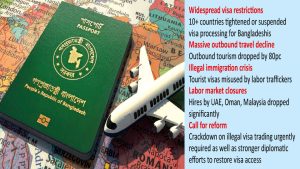Bangladeshi Passport Under Pressure: Visa Restrictions Surge Across Asia, Middle East, and North America

Over the past year, Bangladeshi passport holders have faced mounting visa denials and restrictions from more than a dozen countries across Asia, the Gulf, Europe, and even neighboring India. What started as isolated cases of document fraud and overstays has snowballed into a widespread visa crisis, severely affecting travel, tourism, labor migration, and corporate mobility.
From India to Malaysia: A Shrinking Travel Map
India, once the most popular travel destination for Bangladeshis, has nearly halted visa issuance since late 2024, granting only limited medical and student visas. Meanwhile, Malaysia, a key remittance partner, has suspended low-skilled labor visas amid concerns over recruitment scams and recent terrorism-linked arrests involving Bangladeshi nationals.

Southeast Asian nations like Vietnam, Laos, and Thailand have either fully stopped issuing visas or introduced long processing delays. Indonesia, Cambodia, and even the Maldives have followed suit. Rejections for Thai e-visas alone exceeded 4,500 in June.
Europe, Gulf States, and East Asia Clamp Down
The Gulf region, particularly the UAE, Oman, Bahrain, and Saudi Arabia, has suspended low-skilled or block-work visas for Bangladeshis, citing misconduct and trafficking. In Central Asia and Eastern Europe, countries like Uzbekistan, Kazakhstan, and Romania have frozen processing over concerns about migrants relocating to Western Europe post-arrival.
Even countries with no formal bans—like Japan, China, the US, and UK—are quietly tightening scrutiny. Visa denials for students, tourists, and business travelers have become increasingly common. A recent forgery case prompted Japan to shift all Bangladeshi applications to third-party processing, increasing delays.

The Bigger Picture: Fraud, Image, and Diplomacy
Officials and experts point to deep-rooted issues—fake documents, asylum abuse, and overstay rates—as key factors. Bangladesh’s poor global image following political unrest and international media coverage of extremism have only worsened the situation.
Outbound tourism has dropped by more than 60%, and corporate travel has collapsed by over 70% this year. Travel agencies, tour operators, and the foreign ministry are under pressure to restore access, but many fear things won’t improve without broader governance and security reforms.












